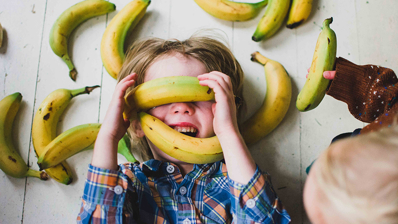Why we should let children play with their food
- Publish date
- Monday, 20 Feb 2017, 8:57AM

Every evening parents across the country bark the same instruction to their young children at the dinner table: "Don't play with your food!"
Now, however, research suggests that youngsters who are allowed to mess around with their fruit and vegetables are actually more likely to eat them.
Researchers found that children given permission to touch, handle and even squash foods such as spinach, cucumbers, bananas and tomatoes were more inclined to snack on them later, reports Daily Mail.
The findings, published in the journal Appetite, suggest this type of sensory play helps young children overcome any resistance they have to foods they are reluctant to eat.
Researchers said the key is not to put pressure on children but to let them play instead.
At no time during the experiment were they encouraged to consume any of the fruits or vegetables. Instead, they naturally took to eating healthy snacks immediately after the test.
It is estimated that only around 16 per cent of pre-school children in Britain eat the recommended daily allowance of five portions of fruit and vegetables.
Experts have long believed the key to increasing their intake is exposing youngsters to taste.
But the latest study, by scientists at De Montfort University in Leicester, suggests touch and feel may be the catalyst to healthier eating.
They recruited 62 pre-school children aged three to four from nurseries around Northampton. Parents were asked to record typical fruit and veg intake in the weeks before the experiment.
Some of the children were then given bowls of broccoli, carrots, spinach, banana, radishes, green beans, oranges, lemons, cucumbers, tomatoes and blueberries.
They were asked to use them to reproduce pictures from the children's book The Very Hungry Caterpillar.
The children were encouraged to squash or reshape the foods if they needed to.
Another group was told to instead play with pompoms, sequins, foam shapes, feathers, glitter and pipe cleaners.
A third group was allowed to play a similar game but with a researcher handling the foods rather than them. Immediately after playing, the children were asked if they would like to try any of the items.
The results revealed that those who had played with them tried significantly more fruit and vegetables than those in the rival groups.
The researchers said: "One explanation is they had time to familiarise themselves and interact with the foods. This would suggest exposure does not have to be based on taste alone.
"We found the largest benefits were with foods that are less familiar, such as pomegranate and kiwi. During play, there was no mention of tasting the food.
"The goal was to engage with it and create something from it. It may be these types of activities increase the likelihood of tasting by children."
Take your Radio, Podcasts and Music with you




